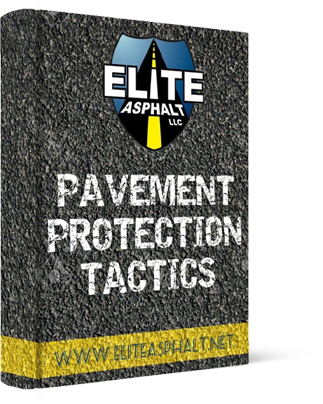Tar and Chip Versus Asphalt. There are more options than you might think when it comes to installing a new parking lot. With a variety of materials available to pick from, selecting the right type for your specific needs and budget can be a challenge. Fortunately, the experts at Elite Asphalt can help you understand the options available to you.
The differences between tar and chip parking lots and asphalt parking lots are aplenty. Both are great options, but each has unique characteristics that make one more advantageous than the other depending on your particular project.
Asphalt Parking Lots
If you’ve ever parked a car in a parking lot, asphalt most certainly was the surface you were driving on. For the best results, the new parking lot area will need to be properly prepared. Excavation and grading are necessary to get the base prepared for the hot mix asphalt and roller. The result after curing is a parking lot that is ready for business.
Advantages of Asphalt Parking Lots Include
- Cost – Compared to sheet concrete, interlocking and a variety of other options for your parking lot, asphalt is affordable and long-lasting, making it one of the best materials to use for parking lots.
- Durability – Done right, and maintained on an ongoing basis, asphalt can last up to three decades before it needs to be redone. Its ability to withstand heavy loads makes it a great solution for heavy traffic areas.
- Aesthetically Pleasing – It’s kind of like putting a suit and tie on for your business. The parking lot space immediately looks sharper, cleaner, presentable. The smooth black finish compliments structures and creates an inviting appeal.
- Malleable – Asphalt is somewhat flexible. If the ground sinks or bows up, there is some wiggle room with asphalt (it bends), and this way it can often avoid major cracking.
Is an asphalt parking lot the right choice for YOU? Consider this…
Asphalt is maintenance intensive. If you want to get the full lifespan of your asphalt parking lot, it must be maintained regularly. This includes crack sealing and filling periodically. In fact, as soon as you see a crack, you should fix it immediately to avoid it getting bigger. Crack sealing every 2-5 years is good practice. You also need to seal it every 3-4 years with seal coating.
Tar and Chip Parking Lots
What the heck is it? A tar and chip parking lot is laid by first laying a loose grave base and then applying a hot mix liquid asphalt tar to it. Then, layers of crushed stone will be spread and rolled on top of the hot mix. It is then compacted down and cured. The finished product is aesthetically pleasing and provides a smooth parking lot surface.
Why Choose Tar and Chip?
- Economical – Aside from gravel, which has nowhere near the curb appeal of tar and chip, it is the least expensive option. It’s a nice happy medium between asphalt and gravel when it comes to budgets.
- Natural Look – Because you can choose the color of the rock (chip) to go onto the surface, you can select a stone that matches or complements the surrounding area.
- Maintenance Free (almost) – No regular sealing, no crack repair. In fact, in hotter climates cracks often fill themselves in as the stones settle into the pad.
- Lifespan – A tar and chip parking lot will last between 7-10 years with very little maintenance.
What are the drawbacks? Consider this…
- Snowplows – Tar and chip is less durable than asphalt. If heavy machinery or snowplows are on the parking lot, be sure to take extra care. The shovel of the machine can easily pull up portions of your roadway or parking lot if you’re not careful!
- Contractors – There’s a technique to laying tar and chip. If you want the most of your tar and chip parking lot, make sure you hire skilled workers with a long track record of doing this type of work — like Elite Asphalt!
Depending on your needs, both tar and chip parking lots and asphalt parking lots have their advantages. Now that you have a better idea of the key differences, it’ll be much easier for you to make the right decision for your parking lot.
Read more details and indicators for when it is time to repave your parking lot.









